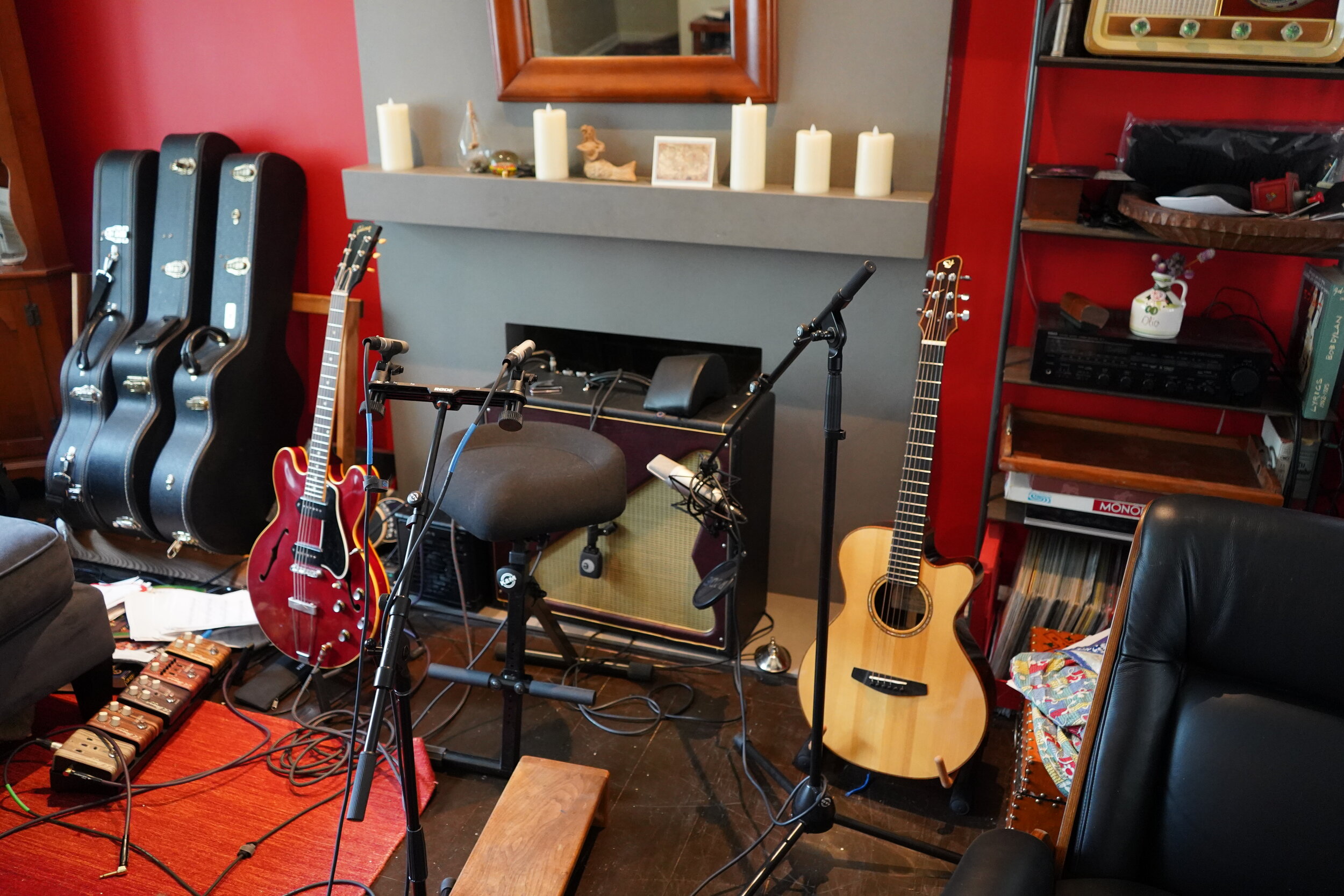Improvisation is a component of a guitarist’s arsenal just as deserving of attention and practice as performance, composition, and arranging. But it is somewhat conceptual and ephemeral, and can therefore be challenging to teach and learn. However, with a few strategies and exercises, you can develop the right frame of mind to begin improvising confidently.
Read More
The sound of a steel-string acoustic or classical guitar, played on the couch, strummed around a campfire, or performed in a concert hall, is perhaps unparalleled in beauty and harmonic richness, as most readers of this magazine can attest. Efforts to amplify acoustic and classical guitar for performance often focus on projecting a natural, uncolored sound. Nevertheless, creative breakthroughs and new approaches to your acoustic guitar playing can be found through experimentation with effects pedals, or stompboxes, that are often associated with electric guitar and bass.
Read More
Before the whole world went all upside down, I had hoped to go back into the studio to do some recording this summer or fall. In the "turn lemons into lemonade" department, I decided instead to work on my home recording skills and set up. I invested in a few decent mics (Rode NT2A, matched pair of Rode NT5, and a Sennheiser e906). Taking advantage of the rest of the family going on a road trip during the first week of July, I spent the week turning the living room into a home recording studio.
Read More
Library publishing is a growing and vibrant field within academic and scholarly publishing. Academic libraries, and sometimes public libraries as well, publish a variety of print and digital publications; often these are focused on open access publications. Some, but not all, library publishing organizations are associated with or partner with a university press at their institutions. Professional development for this field has been a priority for the Library Publishing Coalition and for the Educopia Institute, leading to the development of the Library Publishing Curriculum project, generously funded by the Institute of Museum and Library Services. The first two modules have recently been released, on Content and Impact, and two additional modules will be released soon, on Policy and Sustainability.
Read More
A composer creates, above all. Today’s composers must nevertheless navigate a myriad of factors including commissions, licensing and copyright, distribution and digital streaming, on and on. Perchance in Bach’s day it was easier: toiling in obscurity and poverty, or gaining fame—if not riches—most composers labored under the patronage of a wealthy and influential benefactor. Then again, Bach didn’t have the option of sending a performer MIDI files via Dropbox. Composers in the 21st century possess countless options, although most of us will still be unlikely, except under near-miraculous circumstances, to receive rich recompense for our work. Composing can be rewarding and worthwhile in and of itself, but whether an established or aspiring composer, attention to practical aspects and business details may have a great influence over your ultimate success.
Note: This article first appeared in Classical Guitar magazine's Summer 2017 issue.
Read More
Choice magazine's annual University Press Forum offers the perspectives of University Press directors on a variety of topics. This year's Forum—the 13th in the series—addresses the topic of Innovation at the University Press. Essays from eight University Press directors are included in this year's Forum, including Bruce Austin, RIT Press; Courtney Burkholder, Texas Tech University Press; Faye Chadwell, Oregon State University Press; Steve Cohn, Duke University Press; Linda Manning, The University of Alabama Press; Gianna Mosser, Liz Hamilton, and Jane Bunker at Northwestern University Press; Mary Rose Muccie, Temple University Press; and yours truly.
Read More
My article on improvisation and classical guitar (Classical Guitar Summer 2016) considers the history and context of classical guitar improvisation (and classical music in general); discusses why and when to improvise; and provides some strategies on how to get started.
I had the distinct pleasure of interviewing three imminent classical guitarists—Roland Dyens, Dušan Bogdanović, and Andrew York—asking them many of the same questions. Herein is an edited transcript of these conversations that expands on many of the techniques and topics discussed in part 1.
Read More
The first step, and in some ways the most difficult one, is to wrap your head around the idea of improvisation on the classical guitar. What precisely is improvisation, and what is not? A familiar part of the musical toolbox for guitarists specializing in jazz, flamenco, bluegrass, blues, rock and other genres, improvisation has been relatively neglected, if not exactly derided, in modern classical guitar. This extends to classical music in general, of course. Considering the history of classical music and the evolution of the guitar, it’s perhaps surprising that improvisation does not play a larger role.
Read More
In Make it Stick: The Science of Successful Learning, authors Peter C. Brown, Henry L. Roediger III, and Mark A. McDaniel argue that learning is more meaningful and effective when effortful, even as we are poor judges of when we are learning well and when we are not. ... The relationship of learning, practice, and mastery in the case of musicianship is explored thoroughly in Gerald Klickstein’s The Musician's Way: A Guide to Practice, Performance, and Wellness. Written especially classical and jazz instrumentalists and vocalists at the university level, the book nevertheless provides important lessons for musicians of widely diverse levels and backgrounds.
Read More

